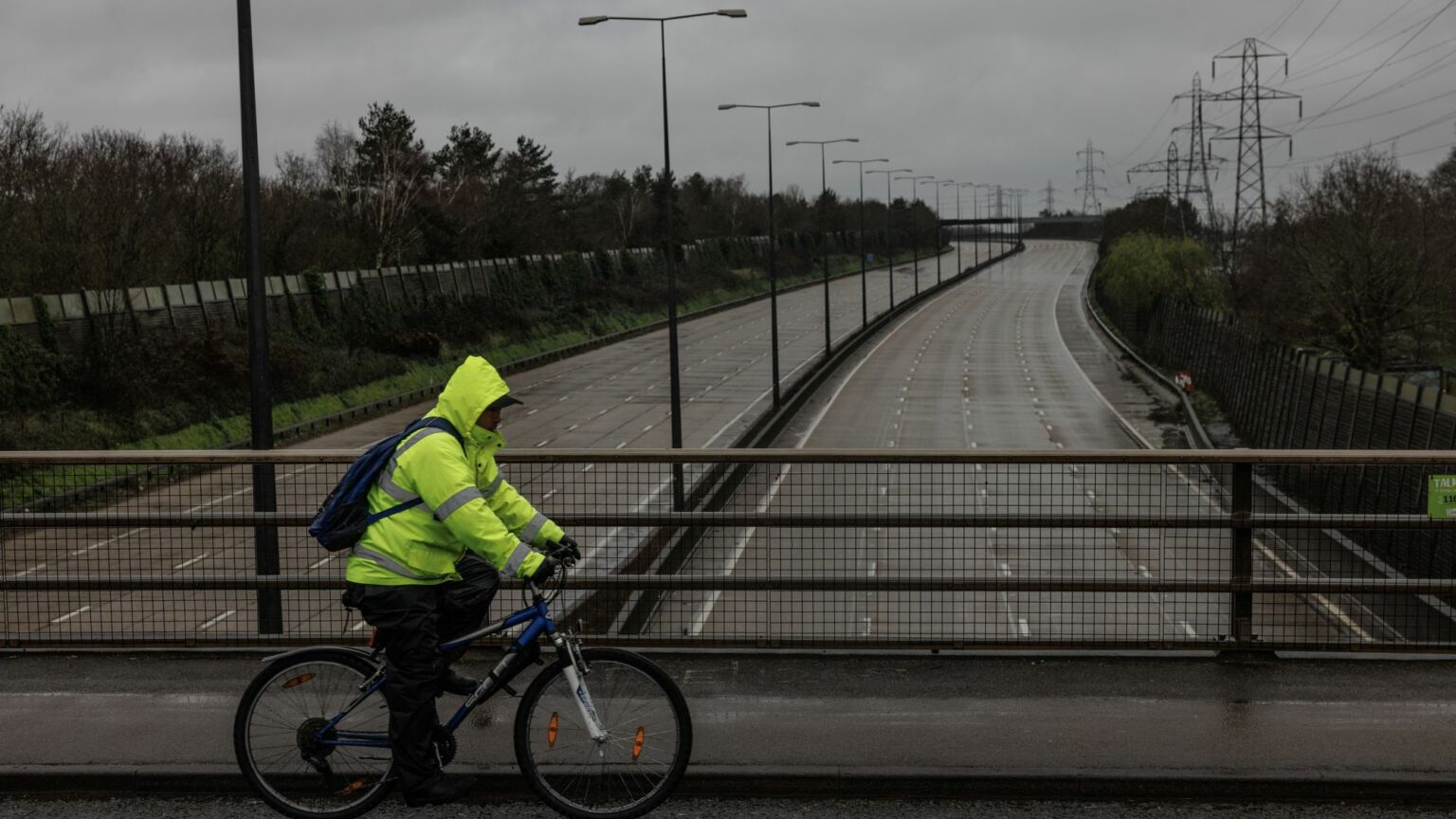Britain’s motorways are on the road to ruin
Our eco-obsessed elite has neglected the needs of drivers.

Want to read spiked ad-free? Become a spiked supporter.
The M25 was subjected to disruption of historic proportions earlier this month. For the first time since it was opened in 1986, part of the UK’s busiest road was scheduled for closure during the daytime. The media warned that closing all lanes across a five-mile section between junctions 10 and 11 in Surrey would herald ‘doomsday’, ‘chaos’ and ‘gridlock’ in the surrounding area. There were even reports of some residents rushing to stockpile food in anticipation. All this fuss was over a plan to demolish a bridleway bridge and erect a gantry in its place.
In the end, much of the panic was unfounded. A section of the motorway was shut on the evening of Friday 15 March and it opened again on the Sunday night. The whole ordeal was less intrusive than predicted, taking 49 hours instead of the scheduled 57. Ultimately, doomsday failed to materialise. People coped and no one starved.
Still, that is not to say that the closure wasn’t a nuisance to everyone in the area. This was only made worse by the fact that so much disruption was caused for what was only a relatively small upgrade. The whole ordeal could easily have been over and done with in a single evening, without closing the M25 for the whole weekend.
There will likely be more disruption to come. The busiest section of the M25 is set to be closed again for another four weekends this year, once in April and three more times during the manic summer season. The work is intended to expand the A3 interchange in Surrey and construct new bridges as part of a £317million upgrade of the M25’s Junction 10.
In some ways it is understandable that the M25 closure sent much of the media into a hysterical frenzy. It wasn’t entirely unreasonable that people would expect the worst. The Junction 10 project has been badly executed from the start. During the roadworks, drivers have had to contend with constant backups, a maze of filter lanes with poor signposting, unpredictable traffic lights and narrow lanes. It has been a prime example of the British state’s incompetent approach to infrastructure.
It doesn’t need to be like this. Indeed, similar projects have been completed elsewhere in far less time and with far less disruption. Many people will have seen a viral video from 2016, in which a tunnel beneath a Dutch motorway was replaced and widened in less than 48 hours. Some lanes of the motorway even remained open for the duration. Both the construction workers and drivers were perfectly safe throughout. Yet that project was orders of magnitude more complex than the Junction 10 upgrade.
Good road engineering is essential for modern life. A dynamic economy needs modern road infrastructure to ensure that people and goods get to where they’re needed in the shortest time possible. It is also a question of freedom. Cars and the road network allow us to go where we want, when we want.
Sadly, it’s becoming increasingly clear that the UK government has lost all interest in promoting this freedom. Most transport policies today are designed explicitly to curtail people’s mobility – from low-traffic neighbourhoods and 20mph zones to ULEZ and other congestion charges. The biggest ‘upgrade’ our roads have received recently has been the rollout of so-called smart motorways – a dangerous scheme that most motorists loathe.
The M25 roadworks only follow this green anti-car pattern. The first bullet point on the National Highways press release boasts that the upgrade works will make life easier for ‘cyclists, pedestrians and horse-riders’, rather than drivers. In an effort to appease eco-activists, the government produced reams of paperwork detailing how it would protect habitats for great crested newts and how it had applied for special ‘bat-mitigation licences’. All of which suggests some rather skewed priorities. The fact that having well-maintained, modern roads is a good thing in and of itself seems to have been forgotten by the very people who are in charge of maintaining them.
Better road infrastructure means more freedom and more economic dynamism. Until the government understands this, Britain will be stuck in the slow lane.
Rowan Sturdy is a sixth-form student studying physics, maths and geography.
Picture by: Getty.
Who funds spiked? You do
We are funded by you. And in this era of cancel culture and advertiser boycotts, we rely on your donations more than ever. Seventy per cent of our revenue comes from our readers’ donations – the vast majority giving just £5 per month. If you make a regular donation – of £5 a month or £50 a year – you can become a and enjoy:
–Ad-free reading
–Exclusive events
–Access to our comments section
It’s the best way to keep spiked going – and growing. Thank you!









Comments
Want to join the conversation?
Only spiked supporters and patrons, who donate regularly to us, can comment on our articles.